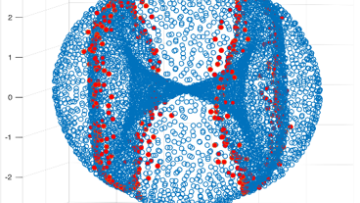On the joint moments of characteristic polynomials of random unitary matrices
This seminar will be held via zoom. Meeting link will be sent to members of our mailing list (https://lists.maths.ox.ac.uk/mailman/listinfo/random-matrix-theory-anno…) in our weekly announcement on Monday.
Abstract
I will talk about the joint moments of characteristic polynomials of random unitary matrices and their derivatives. In joint work with Jon Keating and Jon Warren we establish the asymptotics of these quantities for general real values of the exponents as the size N of the matrix goes to infinity. This proves a conjecture of Hughes from 2001. In subsequent joint work with Benjamin Bedert, Mustafa Alper Gunes and Arun Soor we focus on the leading order coefficient in the asymptotics, we connect this to Painleve equations for general values of the exponents and obtain explicit expressions corresponding to the so-called classical solutions of these equations.
12:45
Scattering Equations in AdS
Abstract
I will discuss an analogue of the CHY formalism in AdS. Considering the biadjoint scalar theory on AdS, I will explain how to rewrite all the tree-level amplitudes as an integral over the moduli space of punctured Riemann spheres. Contrary to the flat space, the scattering equations are operator-valued. The resulting formula is motivated via a bosonic ambitwistor string on AdS and can be proven to be equivalent to the corresponding Witten diagram computation by applying a series of contour deformations.
Oxford Mathematician Vidit Nanda discusses his recent work with colleagues Bernadette Stolz, Jared Tanner and Heather Harrington on detecting singularities in data.
12:45
Joint Moments of Characteristic Polynomials of Random Unitary Matrices
Abstract
I will review what is known and not known about the joint moments of the characteristic polynomials of random unitary matrices and their derivatives. I will then explain some recent results which relate the joint moments to an interesting class of measures, known as Hua-Pickrell measures. This leads to the proof of a conjecture, due to Chris Hughes in 2000, concerning the asymptotics of the joint moments, as well as establishing a connection between the measures in question and one of the Painlevé equations.
IceCube sub-threshold Data


